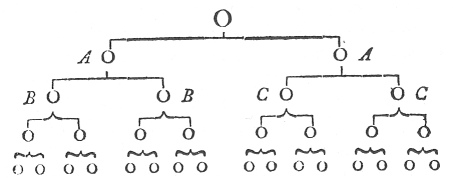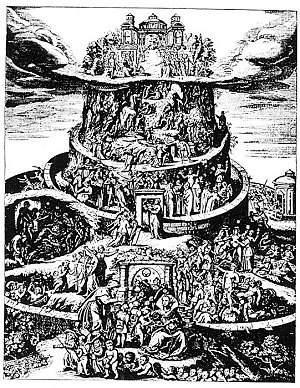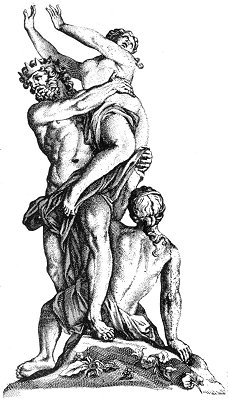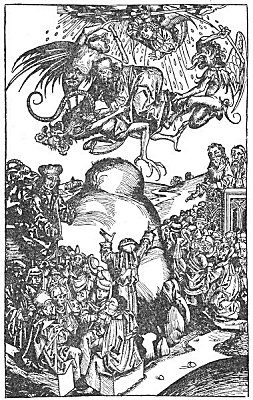p. 476
and not see whither all this is tending, let him proceed, and hear how man was deprived of this happiness by the institution of civil societies.
“An infortunate germ soon vivifies in the breast of man, and his primitive peace and felicity disappear.”
“As families multiplied, the means of subsistence began to fail; the nomade (or roaming) life ceased, and PROPERTY started into existence; men chose habitations; agriculture made them intermix. Language became universal; living together, one man began to measure his strength with another, and the weaker were distinguished from the stronger. This undoubtedly created the idea of mutual defence, of one individual governing divers families reunited, and of thus defending their persons and their fields against the invasion of an enemy; but hence Liberty was ruined in its foundation, and Equality disappeared.”
“Oppressed with wants unknown until that period, man perceived that his own powers were no longer sufficient. To supply this defect, the weakest imprudently submitted to the strongest or to the wisest; not however to be ill-treated, but that he might be protected, conducted, and enlightened.—All submission, therefore, even of the most unpolished mortal, has an existence only in as much as he wants the person to whom he subjects himself, and on the express condition that that person can succour him. His power ceases when my weakness no longer exists, or when another acquires superiority. Kings are fathers; the paternal power is at an end when the child has acquired his strength. The father would offend his children if he pretended to prolong his rights beyond that term. Every man having attained to years of discretion may govern himself, when a whole nation therefore is arrived at that period, there can exist no further plea for keeping it in wardship. ”
In putting such language into the mouth of the Hierophant, the founder of Illuminism had too well studied the strength and illusion of words; he had been too cautious in the choice and preparation of his adepts ever to fear that any of them would answer, “You who thus give oracles, what do you understand by nations having attained their majority? Without doubt such as, having emerged from ignorance and barbarism, have acquired the lights necesssary for their happiness; and to what can they be indebted for these lights and this happiness, if not to their civil association? It will be then, if ever, that they will find it both reasonable and necessary to remain under the guardianship of their laws and of their government, lest they should fall back into the barbarism and ignorance of the roaming clans, or be precipitated into the horrors of anarchy, from revolution to revolution, under the successive tyranny of the brigand, of the executioner of the sophisticated despot, or under that of a sophister Syeyes and his colegislative Marsellois, of a Robespierre and his guillotines, of the Triumvirs and their proscriptions. The populace alone in the minority of ignorance, the sophisters alone in the majority of wickedness and corruption, shall applaud thy mysteries.”
Certain of not meeting with such reflexions from the adepts, the Hierophant continues to inculcate his principles by attributing every thing to strength, and destroying all principles of morality or of reason, though he will
p. 477
affect the tone of both; and ends by forming his judgment on man in society, as he would judge tigers and wild beasts in the forests.—These are his new doctrines.
“Never did strength submit to weakness.—Nature has destined the weak to serve, because they have wants; the strong man to govern, because he can be useful. Let the one lose his force, and the other acquire it, they will then change situations, and he that obeyed will command. He that stands in need of another, also depends upon him, and he has renounced to him his rights. Hence few wants is the first step towards liberty. It is for this reason that the savages are the most enlightened of men, and perhaps they alone are free. 9 When wants are durable, servitude is also lasting. Safety is a durable want. Had men refrained from all injustice, they would have remained free; it was injustice which made them bend beneath the yoke. To acquire safety, they deposited the whole force in the hands of one man; and thus created a new evil, that of fear. The work of their own hands frightened them; and to live in safety they robbed themselves of that very safety. This is the cause of our governments.—Where then shall we find a protecting force? In union; but how rare, alas! is that union, except in our new and secret associations, better guided by wisdom, and leagued in straiter bonds! and hence it is that nature itself inclines us toward these associations.”

Moe is the founder of GnosticWarrior.com. He is a father, husband, author, martial arts black belt, and an expert in Gnosticism, the occult, and esotericism.





